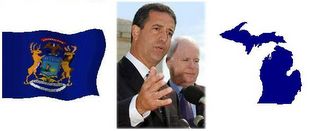Feingold and the Netroots... Good or Bad?
Both of them do a good job at picking apart the article, and Chris Bowers of MyDD does a good job of defending his position in the article. The question it seems to want you to ask by the end is, are the "netroots" a good thing to have supporting Russ Feingold?
Washington - When Gallup polled Democratic voters this month on the party's 2008 hopefuls, it didn't even offer Russ Feingold as a choice.Right. So far, so good. Senator Feingold is largely ignored by the more traditional media outlets, but has support among bloggers and Democratic activists. Nothing objectionable in that, no.
But in one corner of the Democratic universe - the readers of liberal Web logs - the Wisconsin senator has emerged as a political favorite.
In an online poll last month on the nation's most widely read liberal blog (DailyKos.com), Feingold led the Democratic presidential field, picked by 30% of the 11,000-plus people who visited the Web site and voted.
"He definitely is the most popular Democrat among the 'netroots,' " said liberal blogger Chris Bowers, referring to activists in the party who engage in online politics.
The significance of such polls is open to debate, and few would regard them as predictive, especially when you consider that presumed Democratic front-runner Hillary Rodham Clinton lagged way behind Feingold in both online polls.
"What it means is he rings the bells of people who represent the true believers in the Democratic Party," said Andrew Kohut, a non-partisan pollster for the Pew Research Center. "The question is, what is the breadth of his appeal to other Democratic constituencies whose opinions are not as tightly stitched together?"
At a time when the practice of politics online is growing, Feingold clearly sees the "netroots" as integral to the sort of long-shot campaign he may be waging against more established Democrats.
This, too, is perhaps true. I strongly believe in the Democratic Party, and I'm confident in Feingold's ability to win-- with our hard work. But still, it's a fair view of his candidacy, at this point. However, toward the end of the article, we get:
Seiger says he thinks Feingold's popularity in the liberal blogosphere is partly due to the fact that his seat on the Senate Judiciary Committee has allowed him to be a "prominent opposition leader" on issues important to readers of left-leaning blogs, such as the confirmation fight over Justice Samuel Alito, the Patriot Act and the National Security Agency's domestic surveillance program.
Seiger said the blog polls depend on "what the mood of the moment is."
and
One subject of debate about Democratic politics and the Internet is what pressures online activists are exerting on the party.
"They're pulling Democrats to the left," said Patrick Ruffini, a onetime conservative blogger who now heads up Internet campaign efforts for the Republican National Committee.
GOP spokeswoman Anne Marie Hauser said:
"It's not surprising that Russ Feingold is a popular figure in a far-left subsection of the online community. But after Howard Dean's blogosphere popularity turned into catastrophic collapse, the question remains whether Democrats can translate blogger support into broad appeal to win elections."
Darr, of George Washington University, said that if "you think of these blogs as little online tribes of like-minded people . . . they can feed off each other. So I think the blog activity is going to drive each party more toward its ideological extreme."
First, they dismiss support as being sort of whimsical, I guess, because he's getting noticed lately. It apparently has nothing to do with years of public service, promoting honest, effective government, progressive causes, and fairly representing the state of Wisconsin. Then, bloggers like myself are "pulling to the left" and are the "far-left subsection" and the "ideological extreme."
So the GOP definition of Feingold, from this article: he's chasing those unpredictable Dean bloggers, who help make him incredibly, hopelessly liberal. That's it, right?
Anyone who knows anything about Senator Feingold knows that this is decidedly not the case. Does he need the "netroots" to run an effective campaign? Perhaps. The internet can be a very effective fundraising tool, and can help him spread his message very well. But the supporters he have support him because of his principles, his honesty, and his ability to communicate directly with the people that elected him. It's certainly not because he's the "man of the moment."
And it's not because of ideology. Any regular reader of Daily Kos or MyDD knows that there is a wide variety of opinions, from ex-Republicans to ex-Greens. Indeed, many of the "ideological extreme" would have abandoned Feingold a long time ago, after the Ashcroft vote, and the Roberts vote, and the assault weapons ban vote, and his deficit hawk, anti-spending ways. Really, he isn't liberal or conservative, or even what we think of as moderate. In politics, the best term to describe Senator Feingold is "maverick," but with many of his views, outside of Washington I think he'd best fall under "ordinary American."
Of course, Chris Bowers was there in the article to save the day, and say all that in a much shorter form.
Bowers, one of two principal bloggers on MyDD, disputes that view, and argues that Feingold's appeal isn't necessarily about ideology as much as it is about perceptions of him as a "an independent thinker" and a "straight shooter."




0 Comments:
Post a Comment
<< Home